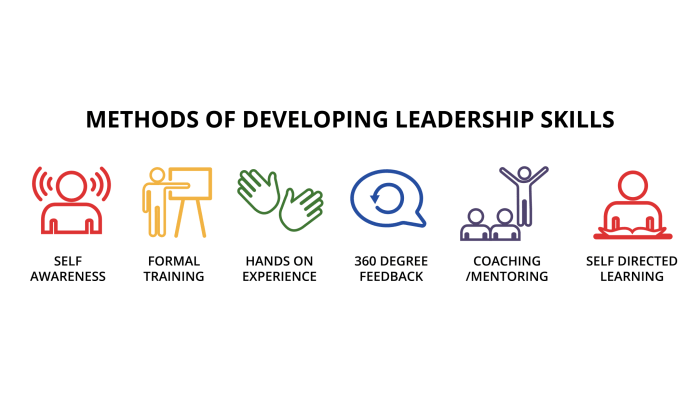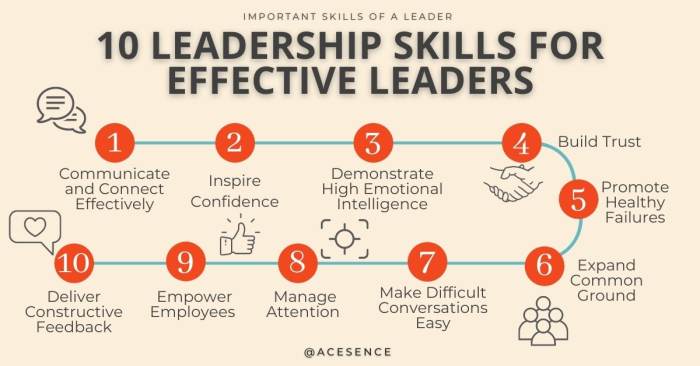Developing Leadership Skills is the key to unlocking your true potential and taking charge of your personal and professional growth. From making impactful decisions to resolving conflicts effectively, leadership skills play a vital role in shaping successful individuals.
As we delve deeper into this topic, we will explore the essential components of leadership development, strategies for enhancing these skills, real-life examples of successful leaders, and much more. Get ready to embark on a journey towards becoming a strong and influential leader!
Importance of Developing Leadership Skills

Developing leadership skills is crucial for both personal and professional growth. It allows individuals to take charge, inspire others, and drive positive change in various aspects of life.
Impact on Team Performance and Organizational Success
Strong leadership skills can significantly impact team performance and organizational success. Effective leaders can motivate team members, foster collaboration, and achieve common goals efficiently.
- Leadership skills empower individuals to make informed decisions that benefit the team and organization as a whole.
- Effective conflict resolution is another key aspect of leadership skills. Leaders who can address conflicts promptly and fairly can maintain a positive work environment and promote productivity.
- By setting a clear vision and direction, leaders can guide their teams towards success and ensure that everyone is working towards a common goal.
Key Components of Leadership Development
Effective leaders possess a combination of essential traits that contribute to their success in guiding and inspiring others. These traits include strong communication skills, empathy, adaptability, and resilience. Let’s delve into the key components of leadership development:
Communication
Effective communication is crucial for leaders to convey their vision, goals, and expectations clearly to their team members. Leaders who excel in communication can inspire trust, build strong relationships, and resolve conflicts efficiently.
Empathy
Empathy allows leaders to understand and connect with the emotions and perspectives of their team members. By demonstrating empathy, leaders can foster a supportive and inclusive work environment, boosting morale and productivity among team members.
Adaptability
In today’s fast-paced and constantly changing business landscape, leaders must be adaptable to navigate unforeseen challenges and opportunities. Leaders who embrace change and adapt their strategies accordingly can steer their teams towards success in any situation.
Resilience, Developing Leadership Skills
Resilience is the ability to bounce back from setbacks and persevere in the face of adversity. Leaders who exhibit resilience can inspire their team members to overcome obstacles, stay motivated, and maintain focus on achieving their goals.
Self-Awareness and Emotional Intelligence
Self-awareness and emotional intelligence play a crucial role in leadership development. Leaders who are self-aware understand their strengths, weaknesses, and emotions, allowing them to make sound decisions and lead with authenticity. Emotional intelligence enables leaders to manage their emotions effectively, empathize with others, and navigate complex interpersonal dynamics.
Continuous Learning and Feedback
Continuous learning and feedback are essential for honing leadership skills. Leaders who prioritize learning and seek feedback from their team members and mentors can identify areas for improvement, refine their leadership style, and grow professionally. By embracing a growth mindset and actively seeking opportunities for development, leaders can enhance their effectiveness and adaptability in leadership roles.
Strategies for Enhancing Leadership Skills: Developing Leadership Skills

Leadership skills can be honed through various strategies that focus on personal development, effective communication, and decision-making. By actively seeking opportunities to grow and learn, individuals can enhance their leadership capabilities and become more effective in guiding and inspiring others.
Mentorship Programs
Mentorship programs provide a valuable opportunity for individuals to learn from experienced leaders and gain insights into different leadership styles. By engaging with a mentor, individuals can receive guidance, feedback, and support to help them navigate challenges and develop their own leadership abilities.
Workshops and Training Sessions
Participating in workshops and training sessions focused on leadership can offer practical skills and tools to enhance leadership capabilities. These sessions often cover topics such as emotional intelligence, conflict resolution, and strategic planning, providing individuals with the knowledge and resources to lead effectively.
Setting Achievable Goals
Setting specific, measurable, achievable, relevant, and time-bound (SMART) goals is crucial for improving leadership skills. By outlining clear objectives and action plans, individuals can track their progress, stay motivated, and continuously strive for growth and development in their leadership roles.
Seeking Diverse Experiences and Challenges
To grow as a leader, it is essential to seek diverse experiences and challenges that push individuals out of their comfort zones. By stepping into unfamiliar territory, leaders can expand their perspectives, adapt to new situations, and develop the resilience and agility needed to lead effectively in a rapidly changing world.
Real-Life Examples of Leadership Development
Leadership development is a continuous journey that requires dedication and growth. Let’s delve into some real-life examples of individuals who have demonstrated remarkable progress in their leadership skills over time.
Case Study: Sheryl Sandberg
- Sheryl Sandberg, the Chief Operating Officer of Facebook, is a prime example of leadership development in action.
- She faced challenges early in her career but used these obstacles as opportunities to learn and grow.
- Through mentorship, continuous learning, and stepping out of her comfort zone, Sandberg transformed into a highly effective leader.
Case Study: Elon Musk
- Elon Musk, the CEO of Tesla and SpaceX, has overcome numerous setbacks and failures on his path to leadership success.
- Despite facing bankruptcy and public criticism, Musk persevered and honed his leadership skills through resilience and innovation.
- His ability to adapt to changing circumstances and stay focused on his vision showcases the importance of continuous leadership development.
Impact of Leadership Development Programs
- Leadership development programs have played a crucial role in shaping individuals and organizations positively.
- By providing access to mentorship, training, and resources, these programs have helped aspiring leaders unlock their full potential.
- Organizations that invest in leadership development programs often witness increased employee engagement, productivity, and overall success.
